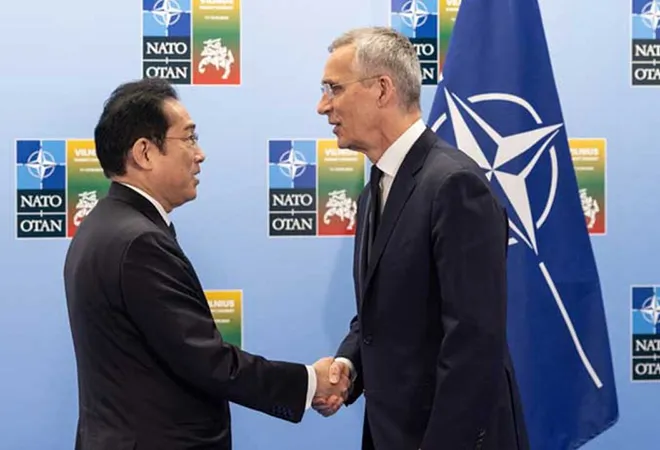-
CENTRES
Progammes & Centres
Location
The Japan-NATO partnership is expected to be an effective one that would further expand in the near future in light of the growing threat posed by China and Russia

The Russia-Ukraine conflict has made NATO summits more significant than ever and this year’s summit held in Vilnius, Lithuania discussed several critical global issues. The top agenda of this summit was the Ukraine crisis and all the leaders focused on ensuring that Ukraine has full support from the major countries. The wide presence of four Asia-Pacific countries: Australia, New Zealand, Japan, and South Korea has made this year's summit more prominent and suggests the growing importance of these nations for NATO. Ukraine’s invasion has brought countries of the United States-led alliance close since the Cold War. NATO allies discussed the potential for Ukraine’s membership in the group as Ukraine is attempting to join NATO.
The Asia-Pacific countries which participated in the summit have been vital nations in supporting Ukraine and imposing sanctions on Russia.
NATO is working on bolstering cooperation with its partners in the Indo-Pacific region and in the current complex security environment, relations with like-minded countries have become important to address global challenges. The Indo-Pacific region is vital for the alliance owing to major developments affecting Euro-Atlantic security. NATO also shares a common goal with Indo-Pacific partners of strengthening the rules-based international order. The Asia-Pacific countries which participated in the summit have been vital nations in supporting Ukraine and imposing sanctions on Russia. NATO’s strategic concept of 2022 mentioned China’s policies as a major challenge to NATO’s security and values. It further mentioned deepening cooperation between China and Russia which is a threat to the rules-based international order. NATO recognising China’s expansionist behaviour as a challenge implies the growing significance of Indo-Pacific countries for the alliance.
Japan’s security is under threat in the current scenario owing to China’s assertive behaviour and North Korea’s nuclear ambitions. Japanese Prime Minister Fumio Kishida also stated that “Ukraine today may be East Asia tomorrow.” which explains the increasing need to boost Japan’s security policy to deter any potential conflict. This has led to growing convergence between Japan and NATO and made their partnership pertinent in this complex security environment.
NATO recognising China’s expansionist behaviour as a challenge implies the growing significance of Indo-Pacific countries for the alliance.
The growing convergence between Japan and NATO is part of this overall trend. One of the latest developments in their partnership is NATO’s planning of opening a liaison office in Tokyo. Japan shares common democratic values with NATO and for the alliance, Japan offers a reliable partner in East Asia. However, one of the NATO’s powerful European countries France opposed the plans of opening a NATO liaison office in Tokyo, fearing that it could estrange China as NATO identified China as a threat to the alliance’s security. France is also apprehensive of the fact that any action jeopardising China’s legitimate rights would lead to an unwavering response. Moreover, France feels that NATO should be restricted to North Atlantic and if the alliance wishes to spread its situational awareness in the East Asian region, it can use the embassies designated as a major point of contact. In a joint communique published during the summit, there was no mention of NATO’s plans of opening an office in Tokyo. Nevertheless, NATO’s Secretary General, Jens Stoltenberg, stated that plans of opening an office in Tokyo are not concrete yet but will be considered in the future.
Kishida and Stoltenberg are planning to adopt a document to bolster cooperation between Japan and NATO for tackling Russia and China as they are strengthening their own military cooperation. The plan is to establish an Individually Tailored Partnership Program (ITPP) that would focus on increasing cooperation between Indo-Pacific and Europe. The agreement would also emphasise cooperating on the cyber and space domains, and maritime security as NATO conducts large-scale cyber defence drills with its members. Japan would also focus on joint evacuation operations with NATO from third-world countries such as Afghanistan. NATO also looks to coordinate with Japan on emerging technologies and share information regarding dual-use technologies of artificial intelligence and quantum computing.
France feels that NATO should be restricted to North Atlantic and if the alliance wishes to spread its situational awareness in the East Asian region, it can use the embassies designated as a major point of contact.
There have been several efforts to integrate with NATO countries in bilateral as well as minilateral formats, for instance, Japan is working on developing a next-generation fighter jet with the UK and Italy to increase the level of interoperability of Japan’s Air self-defence force with NATO air forces. Furthermore, Japan has attempted to deepen its security and cooperative partnerships with nations like India, Vietnam, and the Philippines since the Russia-Ukraine conflict. Being the world’s third-largest economy, Japan is an important development and trade assistance partner for most of the countries and therefore, for NATO, Japan is a vital counterbalance to the influence of nations of having shared security concerns. Japan-NATO partnership would also enhance Japan’s position and prestige as an actor in the international arena and their partnership could prove to be powerful as a deterrent against regional threats.
Japan’s PM Kishida has been apprehensive since the Ukraine invasion which led to the revision of Japan’s National Security Strategy (NSS) document in December 2022. The document explicitly warned that Japan’s security environment is complex and adverse and Ukraine invasion has breached the foundation of rules-based international order. Therefore, Tokyo is working on reinforcing and developing more security partnerships which also includes Europe. Over time, Japan has also understood the importance of deterrence which is evident through its revised NSS documents which mention Japan’s plans of acquiring counter-strike capabilities.
The document explicitly warned that Japan’s security environment is complex and adverse and Ukraine invasion has breached the foundation of rules-based international order.
NATO along with the four Asia-Pacific nations would further aim to improve the interoperability of their miliaries to work together effectively. This will also deepen the knowledge of one another’s military assets. However, NATO exhibits that it is capable enough of maintaining and enhancing engagement in the Indo-Pacific region by strengthening partnerships to respond to challenges posed by Russia and China.
It is quite evident that it is vital for NATO allies to strengthen their partnership with Indo-Pacific nations and allies to be able to address threats and challenges through mutual interests and values. Moreover, NATO and Japan share shared values and concerns and with China’s rise and Russia’s threat, the Japan-NATO partnership is expected to be an effective one to counterbalance and would expand in the near future. Their fundamental aim has been to strengthen deterrence by developing strategic ties and interoperability and further building bridges between the US alliances and the Indo-Pacific region. The current complex security environment and threats posed by China and Russia have led to a clear need for coordination and cooperation among countries and such new partnerships can prove to be beneficial in addressing concerns of maritime security, cyber-defence and space to mention a few. NATO is a regional alliance of Europe and North America, however, over time, its concerns have increasingly become global which go beyond the Atlantic to the Indo-Pacific.
Simran Walia is an Associate Fellow at the Centre for Air Power Studies.
The views expressed above belong to the author(s). ORF research and analyses now available on Telegram! Click here to access our curated content — blogs, longforms and interviews.

Simran Walia is an Associate Fellow at the Centre for Air Power Studies, New Delhi and is pursuing PhD in Japanese Studies under the Centre ...
Read More +